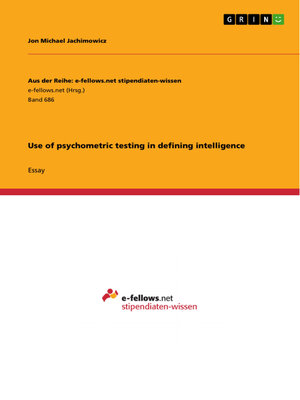Use of psychometric testing in defining intelligence
ebook ∣ Aus der Reihe: e-fellows.net stipendiaten-wissen
By Jon Michael Jachimowicz

Sign up to save your library
With an OverDrive account, you can save your favorite libraries for at-a-glance information about availability. Find out more about OverDrive accounts.
Find this title in Libby, the library reading app by OverDrive.



Search for a digital library with this title
Title found at these libraries:
| Library Name | Distance |
|---|---|
| Loading... |
Essay from the year 2012 in the subject Psychology - Intelligence and Learning Psychology, grade: 20, University of St Andrews, language: English, abstract: Researchers widely disagree on a common definition of intelligence
(Sternberg & Berg, 1986), conceptually describing it as "a general capacity for
inferring and applying relationships drawn from experience" (Herrnstein &
Murray, 1994), emphasizing that "it is not merely book learning []; [it is] a
broader and deeper capability for comprehending our surroundings []"
(Gottfredson, 1997). In stark contrast are more operational definitions based
on psychometric intelligence measures, such as "Intelligence is what the tests
test" (Boring, 1923), or "a person's score on a statistically determined set of
questions" (Herrnstein & Murray, 1994). Although having supported the
theoretical development of intelligence, psychometric tests have been
criticized for their over-simplification, inaccuracies and potential misuse
(Nisbett et al, 2012). This essay will focus on evaluating potential benefits and
drawbacks of using psychometric intelligence tests to help define intelligence,
concentrating on the most dominant 'IQ' test, for which the bulk of evidence
exists. [...]







